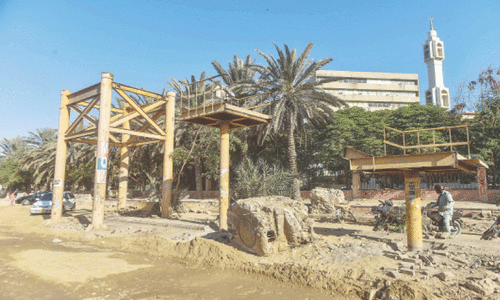ISLAMABAD, Feb 11: Askari Commercial Bank and Kuwait Bank are separately negotiating with the State Bank of Pakistan to acquire 51 per cent shares of Allied Bank Limited.
Informed sources told Dawn here on Wednesday that both the banks had, however, been asked by the central bank that they would have to immediately inject Rs7 billion equity into ABL to remove its losses.
The government had earlier disinvested 49 per cent share of ABL now owned by four parties because of which the new buyers are said to have been facing some problems. The sources said the new buyers were being assured that various irritants in the way would be removed before completing the transaction.
The privatization of the remaining 51 per cent shares of ABL had been taken away from the Privatization Commission and handed over to the State Bank. Section 47 of the Banking and Companies Ordinance, an official said, empowered the central bank to disinvest the remaining shares of ABL without following any criteria prescribed by the Privatization Commission.
"The central bank has been given powers to dispose of any mismanaged bank or arrange its merger with any other bank," the official said. But he did not rule out an open bidding for ABL to make the transaction fully transparent.
Nevertheless, the sources said the first experience of partially privatizing ABL was a failure and the government did not want to repeat that by selling the bank to any unprofessional and financially week group.
The Privatization Commission had reportedly expressed its inability to disinvest ABL because of the problems being faced by the bank, including the existence of huge 'benami' accounts.
The sources said partial disinvestment of ABL to the employees group, which allegedly had been infiltrated by some unscrupulous parties, did not prove to be a correct decision.
Due to poor performance of ABL no annual report was published in 2000, 2001 and 2002, which forced the State Bank to decide to disinvest the bank which is still the fifth largest bank in the country.
ABL is one of the largest banks in Pakistan in terms of assets, deposits and advances. It has a network of 825 branches and 7,082 employees. As on June 21, 2003, the deposit base of the bank amounted to Rs105 billion and total assets Rs114 billion. The paid-up capital of ABL is little over Rs1 billion and its equity account was deficit by Rs3.969 billion. The capital adequacy ratio (CAR) is 14 per cent negative.
As per the categorization done by the State Bank, ABL is included in the category of de-nationalized banks. In 1991, under the Employees Stock Ownership Plan (ESOP) approved by the government of Pakistan, the employees of the bank were allowed to buy and manage the bank.
The Allied Management Group (AMG), representing the employees of ABL, purchased 26 per cent of the total shares at a price of Rs70 per share of Rs10 along with management control of the bank.
Under the sale agreement, AMG was given the option to acquire further 25 per cent shareholding of the bank at the same price within one year of the first transaction. The second transaction was concluded in August 1993.













































